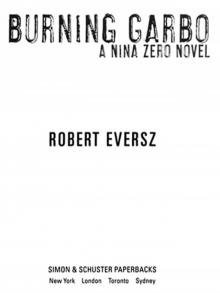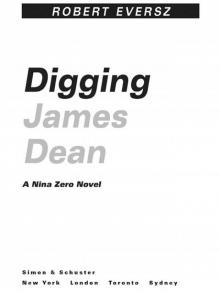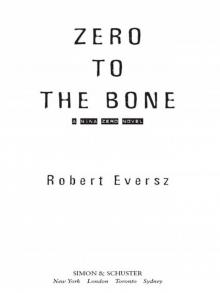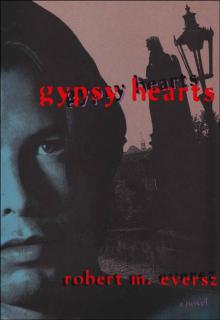- Home
- Robert Eversz
Gypsy Hearts
Gypsy Hearts Read online
GYPSY
HEARTS
Also by Robert M. Eversz
Shooting Elvis
GYPSY
HEARTS
ROBERT M. EVERSZ
Copyright © 1997 by Robert M. Eversz
All rights reserved. No part of this book may be reproduced in any form or by any electronic or mechanical means, including information storage and retrieval systems, without permission in writing from the publisher, except by a reviewer, who may quote brief passages in a review.
Published simultaneously in Canada
Printed in the United States of America
Library of Congress Cataloging-in-Publication Data
Eversz, Robert.
Gypsy hearts / Robert M. Eversz—1st ed.
p. cm.
eBook ISBN-13: 978-0-8021-9637-8
I. Title.
PS3555.V39G97 1997
813′.54—dc21 96-40085
DESIGN BY LAURA HAMMOND HOUGH
Grove Press
841 Broadway
New York, NY 10003
To Prague as it was then.
Homicide is not a sin. It is sometimes a necessary violence on resistant and ossified forms of existence which have ceased to be amusing. In the interests of an important and fascinating experiment it can even become meritorious.
Bruno Schulz
The Street of Crocodiles
WARNING!
This book is a lie, a confidence trick, a wicked jab in the eye of truth. Read at your own risk. Those with high blood pressure, heart problems, weak nerves, and particularly those under psychiatric care, LEAVE THIS BOOK NOW. Management will not be held responsible for the consequences!
GYPSY
HEARTS
1
The story begins with a strapping youth walking across a bridge in Budapest. A rain-slashed night not fit for man but perfect for young beasts. The youth walks as though wave-tossed. His eyes are hard, his lips cruel, his forehead void of the evidentiary marks of thought. He shouts a command—Stride, feet, stride!—but the pitching river of concrete and steel tangles him to his knees. His mouth stretches wide to roar a defiant belch. He belches, therefore he is! He belches again, beer-drunk.
A second figure stalks the youth from behind. The brim-shade of a fedora cloaks his face to a cleft or scar down the center of his chin. His right arm is plunged elbow deep into his overcoat pocket. A gun? A knife? A book of poems he tries to keep dry in the driving rain?
The youth gasps and belches, laughs and belches, farts and belches. The last belch, dangerously moist, leads him to contemplate the Danube as an impromptu vomitory. He measures distance and arc and wind direction. Trajectory is a simple problem but the wind confounds him. It gusts and swirls without rhythm, and each sudden updraft is sharp reminder of the consequences of miscalculation.
No witnesses move hunched against the wind. No rain-specked lights glide toward the bridge. The hat-hid man lopes forward. The pocket of his overcoat hides his right hand. His knuckles strain against pocket cloth. Bent against the rail ahead, the evening’s quarry. Cable slaps against steel plate. Teeth grind. Pocket seams stretch to snapping.
A swell of music please, a march and shriek of strings like Bernard Herrmann composed for Hitchcock, ominous and razor-edge hysterical.
The youth half turns and cocks an arrogant eyebrow. No one would dare to. Not to him. And not this runt of a hat-hid man.
A sliver of gray in the rain.
A startled shout.
Blurred flailing, all hands and feet.
By Newton’s law, a limp sack of punctured mortality plummets neither faster nor slower than raindrops dripping off the bridge railing. It descends as though borne by rain, wind gurgling through gaped mouth. A splatter of flesh against water, and red gushes into the dark Danube.
If this were a movie script, that is how I should pitch it. My former trade. Worked in The Biz, as the movie business is called in Southern California, pretending none other exists. Writer-producer credit on a number of projects. First-name basis with major Hollywood players. Condo by the beach. Porsche in the drive. Poolside sex with starlets, buttocks tickled by the shadows of palm fronds. All by the tender age of twenty-five. But this isn’t a movie script. It’s a confession.
The story begins on a train, clattering into the Central European darkness. The Orient Express. Paris to Budapest. Opulent carriage of mystery and romance. Outside the gilt-framed windows, moonlight bounces like silver coins on a taut shroud of February snow. Inside, the elite recline on red velvet and eat their fill of roast mastodon, poached spotted-owl hearts, and marinated tit-lark tongues.
False start!
Anyone traveling the Orient Express since 1939 would recognize that scene as fabrication relying on old Agatha Christie novels more than truth. I must begin with the truth.
This story does begin on a train. It is night, and February.
But the Orient Express is like any other Central European train: fouled with cigarette smoke, beer piss, and rank sweat from the newly liberated socialist masses. My fool of a travel agent had booked second-class passage, and I sat trapped in a cramped cabin with two Poles, who chain-smoked and quarreled in a language that sounded to my ears like grinding glass. I tried to read, barricaded behind a copy of the Herald Tribune, but a shattered concentration clawed the words to syllables and serifs. When the Poles’ quarrel abruptly ended with the appearance of a bottle of vodka, I grabbed my bag and escaped to the dining car.
I had no intention of eating what passed for food on that train, but the occupants seemed recently scrubbed, if not particularly compelling, and I did not desire a quick return to my boon Polish comrades. At the insistence of a waiter, I was coaxed into joining the table of a portly man who sported a neatly trimmed beard, like the actor Philippe Noiret, to whom he bore a more than slight resemblance. To be forced companions was an annoyance to both of us, and he seemed relieved that I was content to drink mediocre Hungarian wine and stare out the scarred window, ignoring his attack on some goulash-looking thing the waiter had brought to him shortly after I’d arrived. When finished, he clattered the spoon to his empty plate with a musical sigh of such pitch and duration that I inquired, “Indigestion?”
“Non, simplement incapacité.” He wiped his mustache with sharp short strokes of the napkin and observed, with the discreetly contemptuous tone the French reserve for those of my nationality, “Vous êtes américain.”
“Bien sûr, et tu es français,” I responded, switching to the informal form of address. Let him guess whether I was insolent or merely ignorant of French grammar.
The man replied with the classic Gallic shrug, and I thought that would be the end of it, cross swords once and withdraw, but when I returned my gaze to the window, he continued, this time in English, “What do you think of your wine?”
“Ce n’est pas français, ni californie,” I answered.
“Exactement!” he cried, as though my strictly factual observation, intended to sever the conversation, was of great insight. Signaling the waiter for a fresh glass, he filled it with a Bordeaux he said had been pulled just that morning from his wine cellar. I sniffed the bouquet, rolled a drop around my palate, and pronounced it exquis, which, though an exaggeration of the wine’s modest merits, pleased him. He introduced himself as Monsieur Marcel, from Fontainebleau, a château town on the outskirts of Paris. There was no way out but to respond with a few of my own particulars, preferably false. And who am I? The hero of this fool’s tale. Richard Milhous Miller, christened after the thirty-seventh president of the United States and fondly nicknamed Nix by that scion of a used-car dealership empire, my father.
I told Marcel I was a film producer and screenwriter from Hollywood and directed the conversation towar
d discovering a subject of mutual interest. We found it soon enough: women. Despite his happy little family back in Fontainebleau and a fifty-year history of indulgent dining habits, Marcel was, if you’ll forgive the vulgarism, a pussy hound.
I normally shun casual traveling acquaintanceships as the lowest form of human interaction, but Marcel’s erotic obsessions aroused my interest. He claimed he traveled to Budapest once a month, on business, his visits contiguous to a weekend, when he would invariably seduce one of the local women. His methods were simple and direct. He learned where available women congregated, usually one drinking establishment or another, and, settling in at the bar, ordered cognac in a commanding French baritone. If a woman met his glance twice, he approached with a complimentary remark, such as admiring her hair if it was long and lustrous and an obvious point of pride. He insisted on buying her a drink, most commonly French champagne, and never lost an opportunity to commend the woman on her taste, believing compliments from a Frenchman were the sartorial equivalent of the Burning Bush. From such moments, a shared bed was fait accompli.
Discounting the unfailing charm of a French accent, Marcel was not the image of Adonis. When I suggested doubts, he pulled from his breast pocket a wallet-sized photo album and splayed the evidence of his conquests before me. The women were photographed in restaurants, bars, and the occasional bedroom. Nothing artistic. Flashbulb exposures of bleached faces advancing inexorably on drunkenness. A few could have turned heads in daylight. Several were outright slatternly. Most were ordinary, with the curse of the ordinary: a nose too big, a chin too weak, eyes set crooked in an otherwise attractive enough face. The film caught each in an expression of confused desperation, like refugees afraid of missing the train, who don’t know if they will be allowed to board, or to what destination the train will take them if boarded, but needing at all costs to escape the station.
Marcel’s commentary accompanied the photographs: Katalin, a twenty-seven-year-old shopkeeper with watermelon breasts; Ilona, a waitress who liked Marcel because she liked French champagne; Margit, an art student who nearly caused a scandal when she later came to see him in Fontainebleau. I wondered whether the snapshots were part of the excitement or trophies of the score. Did his hands tremble when he pulled out his camera, pretending the idea of taking a snapshot was spontaneous? I stopped him at a photograph of a thin young girl with immense brown eyes. The flash had caught her full red lips parting around the filter tip of a cigarette. The girl couldn’t have been over twenty. Contemplating the tension between her innocent eyes and the carnality of those lips, I asked Marcel how he managed to seduce her.
“Curiosité,” he said. She had never slept with a Frenchman before. The French have a reputation for romance. Most of the women he seduced were curious. Some hoped he might take them away to a new life in the West, but Marcel never enjoyed the favors of the same woman two weeks in a row. He was married and had no need for a relationship. “When I first bed a girl, I give her a red rose and tell her our romance is young and beautiful as this rose, but when the petals of this red rose fall away, so must I.”
The gullibility of women never ceases to astonish me, but that so many could fall for such romantic swill was a revelation. This was my first inkling that the former Iron Curtain countries might be a sexual playground for a Westerner of some style, and the local inhabitants seduced as effortlessly as easing a virgin leg into a pair of jeans. Thus it was I arrived in Budapest with a sense of purpose. But Budapest has little to do with my story, until much later, when other events came into play. I did meet a Monsieur Marcel on the Orient Express, but Marcel is not the story.
The story begins when the train arrives in Prague, where I have plans to live for six months or so, until the cooling of certain legal difficulties, which have recently embroiled me, allows my return to Southern California.
No, the story begins later still.
The story begins the night I accidentally vomited on the shoe of a woman who, much later in our relationship, would try to kill me.
2
I met Katerina at an outdoor café in the shadow of Prague Castle’s St. Vitus Cathedral, identifying her nationality and the nature of her visit by the Polish language guidebook she read above her espresso. She wasn’t the type to attract me at first, not that I’m so disciplined as to narrow my choices to one type over another. Later, I learned to appreciate her eyes for their intelligence and trace of mischievousness. Even her stylish flair with clothes—riding pants, black boots, and olive-green coat—was not enough to make her attractive at first glance. She seemed unnaturally pale even by Slavic standards, her skin broken at the chin by a small constellation of blemishes. Her hair curled so vigorously that, when the wind blew, matted tendrils writhed like a hat of snakes from which the rest of her unremarkable face seemed to shrink in terror. But tourists crowded into every chair at the café except the one opposite hers, so it was natural to ask if I could join her. She agreed. We politely ignored each other during the subsequent half hour, Katerina reading her guidebook and myself penning observations in a notebook, until she tried to pay the check and discovered her wallet missing.
I helped her to reconstruct events: she firmly remembered using the wallet to buy tram tickets earlier that afternoon and concluded it had been stolen sometime between purchasing the tickets and coming to the café. Pickpocketing is a common problem throughout the major cities of Europe, and no less so in Prague. I did what any decent person would have done: took care of her bill and offered to lend her whatever money she needed to survive the next few days.
It helped that we got along well. I promised to take her to the police station, but we soon lost track of time touring the castle and the winding streets of Malá Strana below, reasoning together that her vacation shouldn’t be a complete loss. I had lived through the last of Prague’s winter and the first of her vaunted spring by then and knew the city well enough to amuse the first-time visitor. When later that afternoon we arrived at her hotel, she allowed me to pay her bill, scrupulously writing down my name and address so she could later repay me. The cab then took us to the wrong station for the evening train to Warsaw, and by the time we arrived at the correct one, her train had already left. As the next train wasn’t scheduled until the following morning, I offered her the couch in my apartment. Several hours later, as a result of two bottles of wine and a shortage of blankets, we shared the same bed and let the gravity of our sexes take its course. In the end, she hadn’t shortened her vacation at all, and as the train pulled away protested that she didn’t mind so much losing her wallet because she’d found me.
After dropping Katerina at the station, I wandered the medieval labyrinth of Staré Město, Prague’s old town, exploring those hidden streets where the renovator’s brush had yet to reach and the walls retained a patina of Communist neglect. Prague resembled a Potemkin village then, with the major tourist zones a facade for the crumbling ruins a side street away. After years of living in newer-bigger-brighter Los Angeles, any evidence of decay held me in morbid fascination.
A few hours before midnight, I walked to Lávka, a popular dance club with picture-postcard views of river, bridge, and castle on a hill. Lávka was the meeting place that year for the lawyers, economists, advertising executives, government advisers, returning exiles, small entrepreneurs, and big business interests that comprised the advance army of Western civilization. Various male acquaintances and I often met to drink on the back patio and pick up tourists, who flocked there upon spotting it from Charles Bridge, the fourteenth-century span of stone that arches the Vltava River. Two years after the Velvet Revolution, tourists flooded into the country along the Elbe River to the north, over the mountainous spine of the German border to the east, and through the pine hills of Moravia to the south: Scandinavians, Germans, French, Italians, and Austrians retracing with the instinct of migratory birds the invasion paths of their ancestral tribesmen. They massed at the borders and descended upon Prague each weekend, rape and pillage ree
nacted as shopping, drinking, and whoring. Most went home a few days later, hungover and laden with Soviet army hats, epaulets, watches, and other memorabilia of the victory over the Evil Empire.
Some stayed, particularly the Americans, entranced by Prague’s shabby beauty and carpetbagger economy. Those least qualified for business employment in the West immediately became business experts in the East. English teachers were in such great demand that a passport was deemed ample qualification, and any native speaker untutored in the mysteries of grammar could find work teaching others what he did not know. Most Americans stayed a year, perhaps two, if particularly desperate to avoid responsibility. A few had intentions to settle in Prague on a more permanent basis, but this sort was rarely encountered and was notorious for learning to speak the local language, befriending the inhabitants, and exhibiting other disturbing characteristics of going native.
Andrew was the only Lávka regular I considered a friend, perhaps my only friend in Prague. He sat on the back patio, accompanied by his guitar case and a beer, deep into a characteristic crisis of spirit. Though I considered Andrew my best friend at the time, we had known each other for just under two months; we didn’t know each other at all. But his moods were no secret. He was proud of his moodiness, having made the common error of mistaking it for emotional depth. After he failed to respond to an amusing erotic anecdote about Katerina, whom he had met the night before, I gently chided him about his silence.
“I had a bad shopping day,” he confessed.
I cocked an eyebrow, a conjunctive in the lexicon of facial gestures, meaning And?
“Don’t you ever get upset that you can’t buy anything in this fucking town? Like, all I wanted was a simple tube of toothpaste, it didn’t have to be Colgate or Crest, something from Germany would have done, but I didn’t know the word; then I picked the word out of the dictionary but I couldn’t pronounce it. The clerk looked at me like I was a complete idiot, so I showed her the word, and she shook her head and moved to the next person like I stopped existing. I repeated this, like, in four different stores, took me the entire afternoon, until finally someone gave me a tube of something, and I don’t even know if it’s toothpaste. God only knows what’s in it, certainly not fluoride or tartar control.”

 Burning Garbo
Burning Garbo Digging James Dean
Digging James Dean Zero to the Bone
Zero to the Bone Gypsy Hearts
Gypsy Hearts